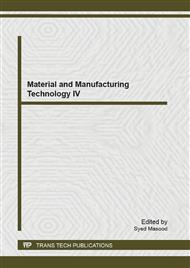[1]
Yu Zhang, "Research on the Pre-Evaluation Methods on Performance Balance of Computer with Intuitionistic Fuzzy Information", AISS: Advances in Information Sciences and Service Sciences, Vol. 4, No. 6, p.161 ~ 167, (2012)
DOI: 10.4156/aiss.vol4.issue6.19
Google Scholar
[2]
Yuping Li , Jingyuan Yin, Guoqiang Wu, "Model for Evaluating the Computer Network Security with Interval-Valued Intuitionistic Fuzzy Information", JDCTA: International Journal of Digital Content Technology and its Applications, Vol. 6, No. 6, p.140 ~ 146, 2012.
DOI: 10.4156/jdcta.vol6.issue6.17
Google Scholar
[3]
Jinshan Zhu, "An Approach to Evaluating the Security of Wireless Sensor Network in Intuitionistic Fuzzy Setting", AISS: Advances in Information Sciences and Service Sciences, Vol. 4, No. 6, p.77 ~ 83, 2012.
DOI: 10.4156/aiss.vol4.issue6.9
Google Scholar
[4]
Yujun Zhang, Wei Teng, "Model for Evaluating the Digital Graphical User Interface Visual Designing with Uncertain Linguistic Information", AISS: Advances in Information Sciences and Service Sciences, Vol. 4, No. 6, p.289 ~ 295, 2012.
DOI: 10.4156/aiss.vol4.issue6.33
Google Scholar
[5]
Lu Han, Liyan Han, Hongwei Zhao, "Study and Application of Credit Scoring Models to Appraisal of the Loan to Chinese Companies with Uncertain Linguistic Information", IJACT: International Journal of Advancements in Computing Technology, Vol. 4, No. 6, p.43 ~ 49, 2012.
DOI: 10.4156/ijact.vol4.issue6.5
Google Scholar
[6]
WeiLi, Qian Li, "The Research of Software Project Risk Assessment with Triangular Fuzzy Information", IJACT: International Journal of Advancements in Computing Technology, Vol. 4, No. 6, p.93 ~ 99, 2012.
DOI: 10.4156/ijact.vol4.issue6.11
Google Scholar
[7]
Fang Qi, "Research on the Comprehensive Evaluation of Sports Management System with Interval-valued Intuitionistic Fuzzy Information", IJACT: International Journal of Advancements in Computing Technology, Vol. 4, No. 6, p.266 ~ 294, 2012.
DOI: 10.4156/ijact.vol4.issue6.33
Google Scholar
[8]
Rong Wang Xia Rong, "An Approach to Evaluating the Class Teaching Quality in University with Intuitionistic Fuzzy Information and Its Application to Students' Creativity", JCIT: Journal of Convergence Information Technology, Vol. 7, No. 7, p.140 ~ 147, 2012.
DOI: 10.4156/jcit.vol7.issue7.18
Google Scholar
[9]
Yan Chi, Dong-hong Wang, "An Approach to Evaluating the Computer Practice Course Reform Based on Computer Multi-media Network Technique with 2-tuple Linguistic Information", IJACT: International Journal of Advancements in Computing Technology, Vol. 4, No. 7, p.102 ~ 109, 2012.
DOI: 10.4156/ijact.vol4.issue7.11
Google Scholar
[10]
.F. Herrera and L. Nartinez, "A 2-tuple fuzzy linguistic representation model for computing with words", IEEE Transactions on Fuzzy Systems, vol.8, no.6, pp.746-752, 2000.
DOI: 10.1109/91.890332
Google Scholar
[11]
F. Herrera and L. Martinez, "A model based on linguistic 2-tuples for dealing with multigranularity hierarchical linguistic contexts in multiexpert decision-making", IEEE Transactions on Systems, Man and Cybernetics-Part B: Cybernetics, vol.31, no. 2, pp.227-234, 2001.
DOI: 10.1109/3477.915345
Google Scholar
[12]
Z. S. Xu. Group decision making with triangular fuzzy linguistic variables, H. Yin et al. (Eds.): IDEAL 2007, LNCS 4881, pp.17-26.
Google Scholar
[13]
P.S. Bullen, D.S. Mitrinovic and P.M. Vasic, Means and Their Ineqalities, Reidel, Dordrecht, 1988.
Google Scholar
[14]
J. M. Merigó, A. M. Gil-Lafuente. The induced generalized OWA operator. Information Sciences, Vol. 179, No. 6, 729-941, 2009.
Google Scholar
[15]
R. R. Yager. Generalized OWA aggregation operators. Fuzzy Optimization and Decision Making, Vol. 3, pp.93-107, 2004.
DOI: 10.1023/b:fodm.0000013074.68765.97
Google Scholar
[16]
H. Y. Chen, C. L. Liu, Z. H. Sheng. Induced ordered weighted harmonic averaging (IOWHA) operator and its application to combination forecasting method, Chinese Journal of Management Science, Vol. 12, No. 5, pp.35-40, 2004.
Google Scholar
[17]
Guiwu Wei, Fuzzy linguistic hybrid harmonic mean operator and its application to software selection, Journal of Software, Vol. 4, No. 9, pp.1037-1042, 2009.
DOI: 10.4304/jsw.4.9.1037-1042
Google Scholar
[18]
Xioafei Zhao and Guiwu Wei, Fuzzy linguistic hybrid geometric aggregation operator, Journal of Computational Information Systems, Vol. 5, No. 5, pp.1419-1424, 2009.
Google Scholar


